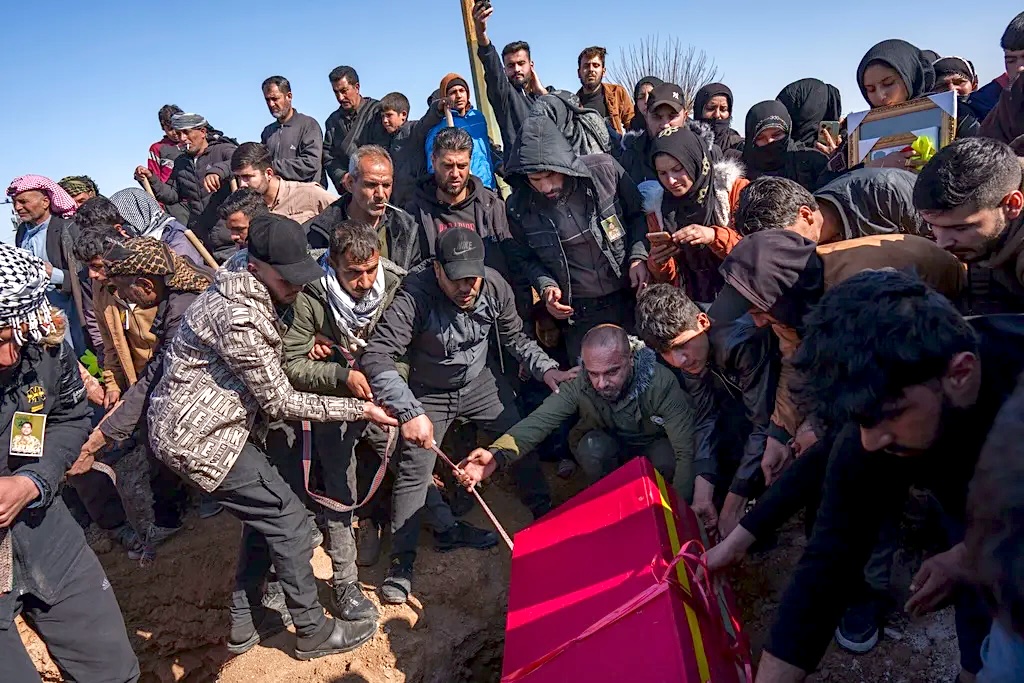Men lower the coffin of a Syrian Democratic Forces fighter killed by a Turkish-backed militia in the northeastern village of Daoudiya, Wednesday, Jan. 29, 2025. (AP Photo/Bernat Armangue)
While the Trump administration is focused on releasing all the hostages, making the Gaza and Lebanon ceasefires permanent, bringing the Israelis and Saudis toward normalization, and strategizing on what to do if Iran makes a mad dash to the bomb, a less imminent but equally important event is reshaping the Middle East for decades to come.
Turkey is in talks with its paramilitary Islamist allies Hayat Tahrir al-Sham, to solidify the group’s influence and control over the new Syrian government. Turkish President Recep Tayyip Erdogan and his administration are in negotiations with Syria’s interim president, Ahmed al-Shaara. Shaara is the former head of an al-Qaeda affiliate which Erdogan supported for seven years.
Turkey wants to have permanent military and air bases in the Syrian desert and control of Syrian airspace. The new Turkish hegemon, part of Erdogan’s neo-Ottoman resurrection, could threaten America’s most important regional ally, Israel. Prior to the Turkish takeover, Israel had freedom of action to attack Hezbollah bases in Syria, with Russia’s acquiescence.
Although Iran is not dominating the Syrian Assad government anymore, Turkey shares the Iranian interest in threatening, delegitimizing and weakening Israel. It may seem unlikely now, but it is possible that, in the name of shared anti-Zionist interests, Turkey will allow its airspace and Syrian territory to resupply Hezbollah in Lebanon in the future.
Turkey has worked to advance Iranian interests before. Turkish banks in 2013 and 2014 helped Iran evade sanctions, “yielding an estimated $13 billion at the height of the efforts” for the Ayatollah and his minions, according to Jonathan Schanzer of Foundation for Defense of Democracies, writing in the Atlantic. A Turkish banker was prosecuted and sentenced in the U.S. in 2018 for the “financial crime of moving billions in dollars and gold from Turkey to Iran through a complex network of businesses, banks, and front companies.”
As for the Russians, they are in negotiation with the new Syrian government to keep their warm water port on the Mediterranean in Tartus and their Khmeimim airbase. However, if Turkey is calling the shots in Syria, it is an opportunity for Erdogan to extract concessions from Vladimir Putin.
This brings us back to American policy for a future Syria dominated by Turkey.
Turkey is part of NATO and has the alliance’s second-largest army. But it has shown independence and contempt for other members of the organization. With Erdogan feeling empowered and the Trump administration distracted by Gaza, Lebanon and Iran, Erdogan will shrewdly move towards solidifying an alliance with the new Syria and gain for himself the most important Turkish expansion since the humiliation of losing the Ottoman Empire.
To understand Erdogan, listen to his words: “Turkey is much bigger than Turkey as a nation. We cannot limit our horizon to 782,000 sq/km. … Turkey, as a nation, cannot flee or hide from its destiny. We must see, accept, and act according to the mission that history has given us as a nation. Those who ask, ‘What is Turkey doing in Libya, Syria, and Somalia?’ may not be able to conceive the mission and the vision.”
America cannot wait to confront Erdogan. At any time, Erdogan can decide, with the Trump administration distracted by its desire for a permanent ceasefire in Gaza, to move his armies again, as he did beginning in 2016 into Syria.
That move set the stage to attack our Syrian Kurdish allies in northwest Syria. This time, it would be in their last refuge, in northeast Syria. A collapse of the Kurdish-dominated Syrian Democratic Forces, who defeated and now detain thousands of ISIS fighters, could lead to a reemergence of jihadists who are only a few degrees of separation from Erdogan’s Muslim Brotherhood and The new Syrian government’s Islamist ideology.
With so much on their plate, Secretary of State Marco Rubio and national security advisor Mike Waltz should expand their team’s bandwidth and to deal with Turkey and Syria now rather than later. If they don’t, the administration will be dealing on less advantageous terms in the next 24 months with an expansionist Turkey and an Islamist Syria, when there will be little to dissuade Erdogan from challenging the Israelis, our most essential ally in the region.
This article originally appeared in The Hill on February 12, 2025.
Eric R. Mandel is the senior security editor of the Jerusalem Report and the director of the Middle East Political Information Network (MEPIN).
